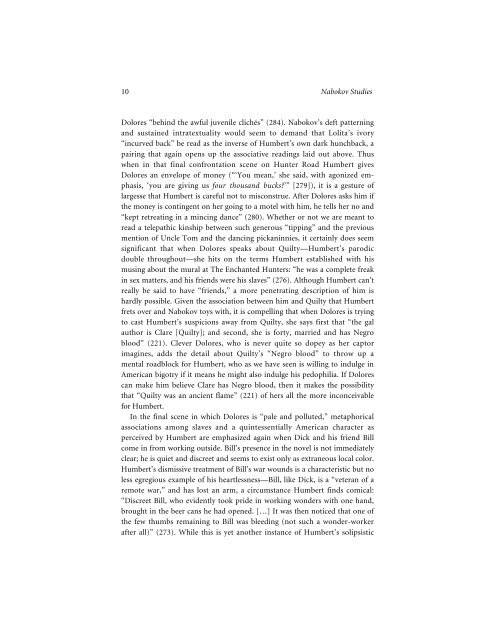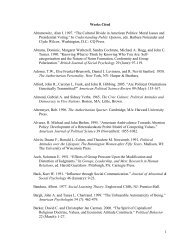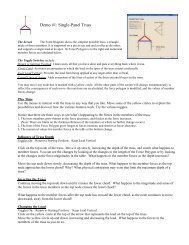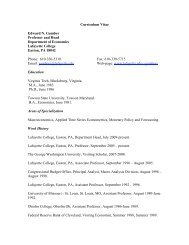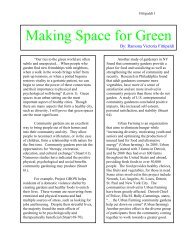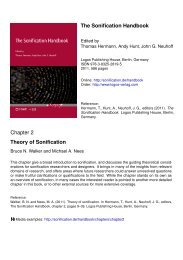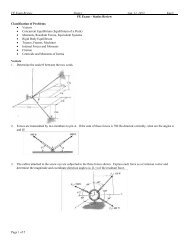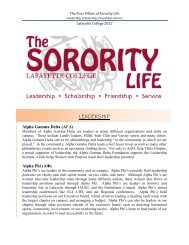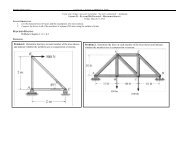Of Pickaninnies and Nymphets: Race in Lolita - Project MUSE
Of Pickaninnies and Nymphets: Race in Lolita - Project MUSE
Of Pickaninnies and Nymphets: Race in Lolita - Project MUSE
- No tags were found...
You also want an ePaper? Increase the reach of your titles
YUMPU automatically turns print PDFs into web optimized ePapers that Google loves.
10 Nabokov StudiesDolores “beh<strong>in</strong>d the awful juvenile clichés” (284). Nabokov’s deft pattern<strong>in</strong>g<strong>and</strong> susta<strong>in</strong>ed <strong>in</strong>tratextuality would seem to dem<strong>and</strong> that <strong>Lolita</strong>’s ivory“<strong>in</strong>curved back” be read as the <strong>in</strong>verse of Humbert’s own dark hunchback, apair<strong>in</strong>g that aga<strong>in</strong> opens up the associative read<strong>in</strong>gs laid out above. Thuswhen <strong>in</strong> that f<strong>in</strong>al confrontation scene on Hunter Road Humbert givesDolores an envelope of money (“‘You mean,’ she said, with agonized emphasis,‘you are giv<strong>in</strong>g us four thous<strong>and</strong> bucks?’” [279]), it is a gesture oflargesse that Humbert is careful not to misconstrue. After Dolores asks him ifthe money is cont<strong>in</strong>gent on her go<strong>in</strong>g to a motel with him, he tells her no <strong>and</strong>“kept retreat<strong>in</strong>g <strong>in</strong> a m<strong>in</strong>c<strong>in</strong>g dance” (280). Whether or not we are meant toread a telepathic k<strong>in</strong>ship between such generous “tipp<strong>in</strong>g” <strong>and</strong> the previousmention of Uncle Tom <strong>and</strong> the danc<strong>in</strong>g pickan<strong>in</strong>nies, it certa<strong>in</strong>ly does seemsignificant that when Dolores speaks about Quilty—Humbert’s parodicdouble throughout—she hits on the terms Humbert established with hismus<strong>in</strong>g about the mural at The Enchanted Hunters: “he was a complete freak<strong>in</strong> sex matters, <strong>and</strong> his friends were his slaves” (276). Although Humbert can’treally be said to have “friends,” a more penetrat<strong>in</strong>g description of him ishardly possible. Given the association between him <strong>and</strong> Quilty that Humbertfrets over <strong>and</strong> Nabokov toys with, it is compell<strong>in</strong>g that when Dolores is try<strong>in</strong>gto cast Humbert’s suspicions away from Quilty, she says first that “the galauthor is Clare [Quilty]; <strong>and</strong> second, she is forty, married <strong>and</strong> has Negroblood” (221). Clever Dolores, who is never quite so dopey as her captorimag<strong>in</strong>es, adds the detail about Quilty’s “Negro blood” to throw up amental roadblock for Humbert, who as we have seen is will<strong>in</strong>g to <strong>in</strong>dulge <strong>in</strong>American bigotry if it means he might also <strong>in</strong>dulge his pedophilia. If Dolorescan make him believe Clare has Negro blood, then it makes the possibilitythat “Quilty was an ancient flame” (221) of hers all the more <strong>in</strong>conceivablefor Humbert.In the f<strong>in</strong>al scene <strong>in</strong> which Dolores is “pale <strong>and</strong> polluted,” metaphoricalassociations among slaves <strong>and</strong> a qu<strong>in</strong>tessentially American character asperceived by Humbert are emphasized aga<strong>in</strong> when Dick <strong>and</strong> his friend Billcome <strong>in</strong> from work<strong>in</strong>g outside. Bill’s presence <strong>in</strong> the novel is not immediatelyclear; he is quiet <strong>and</strong> discreet <strong>and</strong> seems to exist only as extraneous local color.Humbert’s dismissive treatment of Bill’s war wounds is a characteristic but noless egregious example of his heartlessness—Bill, like Dick, is a “veteran of aremote war,” <strong>and</strong> has lost an arm, a circumstance Humbert f<strong>in</strong>ds comical:“Discreet Bill, who evidently took pride <strong>in</strong> work<strong>in</strong>g wonders with one h<strong>and</strong>,brought <strong>in</strong> the beer cans he had opened. […] It was then noticed that one ofthe few thumbs rema<strong>in</strong><strong>in</strong>g to Bill was bleed<strong>in</strong>g (not such a wonder-workerafter all)” (273). While this is yet another <strong>in</strong>stance of Humbert’s solipsistic


